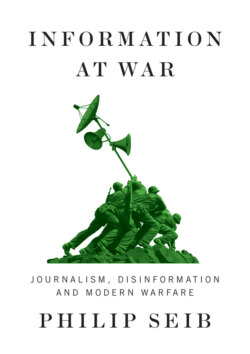Information at War

Реклама. ООО «ЛитРес», ИНН: 7719571260.
Оглавление
Philip Seib. Information at War
Table of Contents
Guide
Pages
Information at War. Journalism, Disinformation, and Modern Warfare
Copyright Page
Epigraph
Preface and Acknowledgments
Introduction
Notes
1 Living-Room Wars
Murrow in London
The Early Stages of the Vietnam War: John F. Kennedy and “Managing Information
Lyndon Johnson’s War, Television’s War
Tet
Notes
2 Competing for Information Control
Falklands War 1982
Gulf War 1990–1991
Information Channels as Wartime Diplomatic Tools
Embedded War
The 2011 Arab Uprisings
Syria
Notes
3 War Information Expands
“Never Again”
Information Challenges in Bosnia
Myanmar
Journalism of Attachment
Information from War-Zone Occupants
Crowd-Sourced Information
Women’s Stories and Women’s Storytelling
Fleeing War: Refugees and Information
What Has Changed?
Notes
4 Social Media Go to War
Merging Old and New: Photography at War
Terrorists’ Information Warfare
On the Battlefield: Hamas versus Israel
Public Diplomacy Goes to War
Notes
5 Russia and New Dimensions of Information at War
“Draw America into the War!”
The Kremlin’s Cold War Information Tools and US Response
Restructuring Russia’s Information Arsenal
Information as 21st-Century War
The Internet Research Agency
“Active Measures” and the 2016 US Presidential Election
The US Cyber Command Attack
Targets. Ukraine
The Baltic States
Sweden
Finland
Turkey
Libya
Notes
6 From Media Manipulation to Media Literacy
Saudi Arabia and the United Arab Emirates versus Qatar
Information and Prolonging Conflict: Afghanistan
Caring about War
IoT and AI
Fighting Back against Disinformation
Understanding the audience and how it gets information
Media literacy
The news media’s role
Pandemics and other medical matters
Notes
7 Where We’ve Been, Where We’re Going
The Churn
Social Media Culture and Information at War
Next Steps for Information in the Battle Space
China
Why China matters
China’s “Three Warfares”
Information at War
Notes
Selected Bibliography
Index
POLITY END USER LICENSE AGREEMENT
Отрывок из книги
Philip Seib
Carl von Clausewitz, On War
.....
Gatekeepers have always been present in one form or another to govern information flows. In some cases, such as in China, these are government censors who rigidly oversee content before it can reach the public. In countries where information freedom is respected, newspaper editors, television producers, and other media professionals make decisions about newsworthiness based on criteria ranging from basic moral values to commercial interests such as keeping advertisers happy.
These gatekeepers were particularly influential when the media universe was more finite. Fifty years ago in the United States, consumers of television news had only three national channels to choose from, and newspapers served only limited geographic areas. Today, in much of the world, there is no such thing as local, or even national, news in terms of limitations on distribution to an audience. Even many small community newspapers rely on their websites to deliver their product, and so people anywhere in the world with internet access may read about town council doings and school lunch menus. On a grander scale, online news and satellite television are largely unconstrained by national borders. Citizens of most nations can read, listen, or watch how news media in other countries cover their own and others’ homelands. Governments that don’t want this coverage to reach their populations must struggle mightily to choke off incoming material that they find uncongenial.
.....